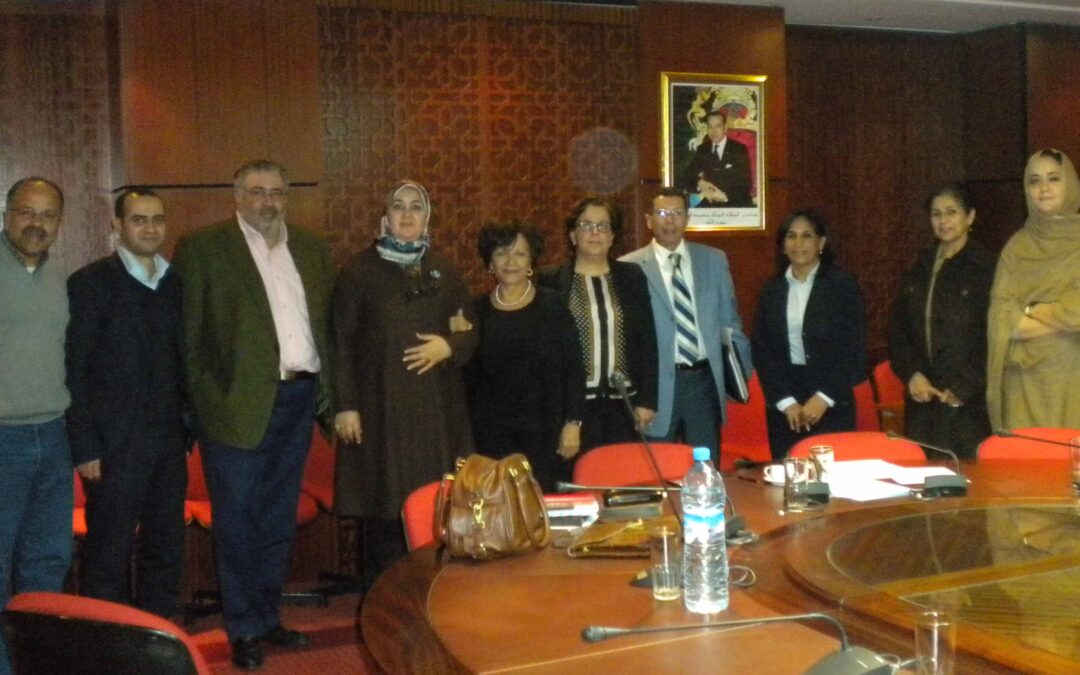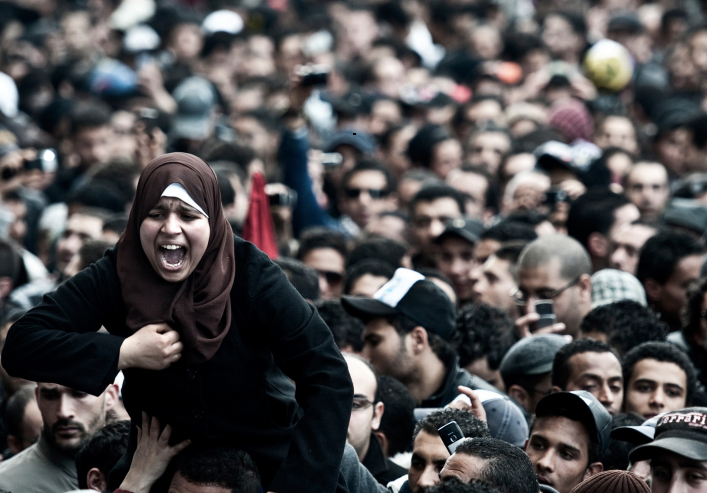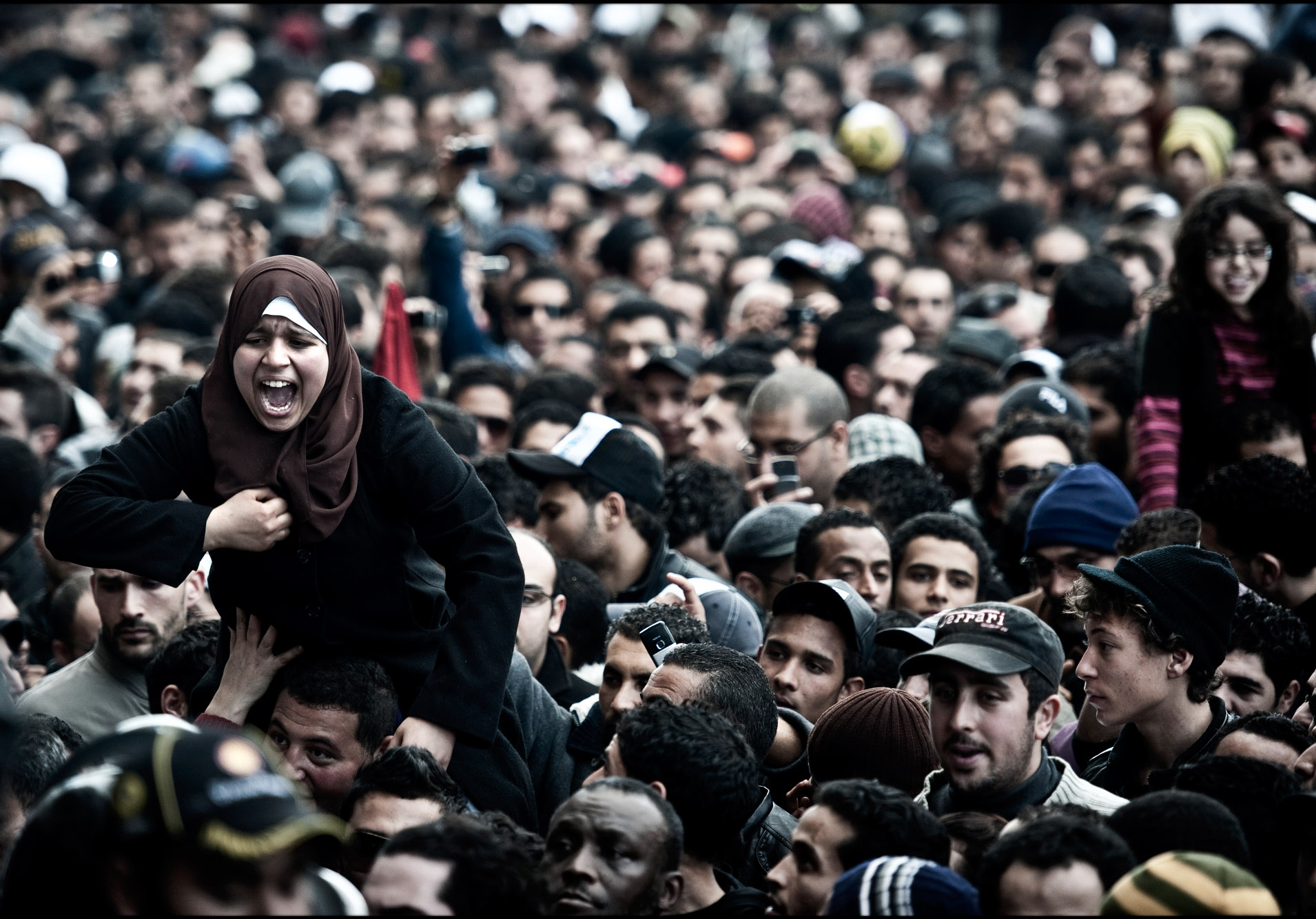
Jun 19, 2013
This side event was held recently at the UN Human Rights Council. If you missed it, you can read the summary report and/or watch it here. Listen also to interviews of human rights defenders from Ecuador and Uganda.
UNSideEvent-Corporate complicity-conference report-2013 (full text in pdf)
Watch the side event:
Listen to the interview in Spanish with Humberto Piaguaje Lucitante (Ecuador)
Listen to the interview in Spanish with Pablo Fajardo Mendoza (Ecuador)
Listen to the interview with Peter Kayiira (Uganda)

Apr 16, 2013
The ICJ, FIDH and EMHRN call on the Moroccan authorities to comprehensively reform the judiciary and to bring it in line with international standards.
Reforms should be aimed at ending effective executive control over the Higher Judicial Council, reforming the statute of magistrates, ensuring the independence of prosecutors and removing the military court’s jurisdiction over civilians.
The call comes as the ICJ, the International Federation for Human Rights (FIDH) and the Euro-Mediterranean Human Rights Network (EMHRN) ended a high-level mission to Morocco to assess the current legal framework and its adherence to the principles of judicial independence, impartiality and accountability.
In a memorandum addressed to the Moroccan authorities, the three organizations formulated 20 specific recommendations for reform.
“The Moroccan authorities should amend the law to put an end to the comprehensive control the executive exercises over the career of judges, including their nomination, promotion and disciplinary proceedings against them, and should adopt a new law on the Higher Judicial Council”, said Souhayr Belhassen, FIDH president.
In addition, the Moroccan Military Code extends the jurisdiction of military tribunals to try civilians, in contravention of international law and standards. It fails to provide full guarantees of fair trial by a competent, independent and impartial tribunal, including the rights to defence and to appeal.
“The Moroccan authorities must end the use of military courts to try civilians and limit the jurisdiction of military tribunals to military offences and personnel only”, said Michel Tubiana, EMHRN president.
The organizations reiterated that the Moroccan authorities should also take immediate measures to end executive control over the Office of the Public Prosecutor.
“The subordination of Moroccan prosecutors to the Minister of Justice has had an adverse impact on the investigation and prosecution of human rights abuses. Moroccan authorities should act to ensure that prosecutors are able to carry out their duties independently, impartially and in defence of human rights”, said Said Benarbia, ICJ senior legal adviser for the Middle East and North Africa (MENA) programme.
During the mission, the delegation met with Mr. Mustapha Ramid, Minister of Justice; Mr. Karim Ghallab, President of the Deputies Assembly; Mr. Omar Dkhil, President of the Justice and Legislation Commission of the Counsellors Assembly; Mr. Driss El Yazami, President of the National Council for Human Rights; the Parliamentarian Network against the Death Penalty; and civil society representatives, including human rights organisations. These organizations have persistently called upon the Moroccan authorities to reform the judicial system.
The delegation was composed of Souhayr Belhassen, FIDH president; Michel Tubiana, EMHRN president; and Said Benarbia, ICJ senior legal adviser for the MENA programme.
Contact:
Said Benarbia, ICJ Senior Legal Adviser of the Middle East and North Africa Programme, tel: 41 22 979 38 17, e-mail: said.benarbia(a)icj.org
Morocco-Mémorandum sur la réforme du pouvoir judicaire-mission report-2013-ar (full text in pdf)

Feb 21, 2013
 Reform of the Moldovan judicial system needs further commitment from parliament, government, the judiciary and judicial bodies, if recent legislative measures are to bring real change, according to a new report.
Reform of the Moldovan judicial system needs further commitment from parliament, government, the judiciary and judicial bodies, if recent legislative measures are to bring real change, according to a new report.
The report Reforming the Judiciary in Moldova: Prospects and Challenges, launched today by the International Commission of Jurists (ICJ) and the Soros Foundation-Moldova (SFM), follows an ICJ mission to this country in September 2012 and analyses the recent progress made in reform of the Moldovan judicial system.
Today’s report welcomes many of the comprehensive legislative reform that have been enacted in the past year, but warns that further measures are needed to build a strong and independent judiciary, in practice as well as in law, and to ensure that effective mechanisms of judicial accountability are applied fairly and are compatible with judicial independence.
“Judges are responsible for one of the most important functions in any society – the fair and effective administration of justice. The priority that is being given in Moldova to judicial reform is therefore welcome,” said Róisín Pillay, Director of the ICJ Europe Programme. “A strong and independent judiciary is essential to ensure that everyone can be confident of a fair hearing when they come before the Courts, and of an effective remedy when their rights have been violated.”
“Judicial independence goes hand in hand with judicial accountability – judges are not above the law. But the reforms must always ensure that there are effective safeguards against any improper interference so that judges can adjudicate impartially without fear of victimization,” Pillay added.
“The Soros Foundation-Moldova is particularly concerned with the lack of equal attention to accountability, independence and transparency of the judiciary. We are confident that this could not be achieved unless every judgment is properly reasoned,” said Victor Munteanu, Justice Program Director at SFM.
The report calls the current reforms the most ambitious undertaking in decades, but warns against poor implementation of good laws and initiatives.
Among other measures, the report recommends reconsideration of the necessity of the initial five-year appointment period for newly appointed judges and modification of the system of security checks on judges.
It also stresses that any periodic evaluation of judges must not lead to the dismissal of judges before they have been given an adequate opportunity to redress any failings, and must not serve as a back door for dismissing judges.
In addition, the report emphasizes the need to raise judicial salaries as a matter of priority, and supports enhanced judicial training, in particular on human rights law.
In parallel with raising judicial salaries, consideration must be given to the current laws on early retirement of judges and the system of receiving salaries and pensions in parallel.
It further underlines the importance of reasoned judgments in ensuring a fair hearing and expresses serious concerns at the recent amendment to the Civil Procedure Code, which removes the requirement for first instance judges to give reasons for decisions in civil cases.
The ICJ recommends that the impact of this amendment should be monitored, and consideration should be given to repealing it, should it be shown to give rise to any barriers to access to justice.
Regarding accountability measures, the report finds that the removal of the requirement for the Superior Council of Magistracy’s authorization for prosecution of a judge, in regard to crimes of judicial corruption, may help to re-establish the credibility of the judiciary.
However, given the concerns as to the potential abuse, any prosecutions of judges on corruption charges under the new legal provisions, must be carefully monitored and scrutinized.
Clear and detailed procedures for disciplinary action, including for hearings before the Disciplinary Board as well as the Superior Council of Magistracy, should be developed, to ensure the greatest possible consistency and predictability in the application of disciplinary measures, the report says.
The ICJ also expresses concern at the presence of the Minister of Justice and the Prosecutor General on the Superior Council of Magistracy, and in particular their resulting power to initiate disciplinary proceedings, and recommend their removal as ex officio members.
The report was developed within the “Improving the observance of the Right to Liberty and Security of Person in Moldova” project, implemented by Justice Program of the SFM in partnership with the Superior Council of Magistracy and the Supreme Court of Justice.
The project advocates for the development of coherent and sustainable accountability mechanisms for judges.
Contacts:
Róisín Pillay, Director, ICJ Europe Programme, m +41 79 742 7128; e-mail: roisin.pillay(at)icj.org
Victor Munteanu, Director, SFM Justice Program, m + 373 22 27 00 31; e-mail: vmunteanu(at)soros.md
Moldova-ICJ-SFM Report judicial reforms-publication-2013-ENG-ROM (full text in pdf)
Moldova-Report judicial reforms-press release-2013 (full text in pdf)
Moldova-Report judicial reforms-press release-2013-ROM (full text in pdf)

Feb 1, 2013
 In a new report, the ICJ calls on the authorities, especially the National Constituent Assembly, to elaborate and adopt a constitution that takes account of the full range of views of the Tunisian people and adheres to international law and standards.
In a new report, the ICJ calls on the authorities, especially the National Constituent Assembly, to elaborate and adopt a constitution that takes account of the full range of views of the Tunisian people and adheres to international law and standards.
Released today, the report, Enhancing the Rule of Law and guaranteeing human rights in the Constitution, comes as the ICJ concludes a high-level mission to Tunisia. It analyzes the constitutional reform process in Tunisia and sets out recommendations for legal and institutional reforms aimed to ensure a Constitution that reflects international law and standards.
Through its report, the ICJ calls for the Constitution to be amended to: fully guarantee the separation of powers; ensure the accountability of the security services and armed forces and their subordination to a civilian authority; bring the judicial system in line with international standards of independence, impartiality and accountability; end the use of military courts to try civilians and cases involving human rights violations; incorporate a comprehensive Bill of Rights; recognize the right to life as an absolute right, and abolish the death penalty; and provide effective mechanisms for the protection of human rights and ensuring the right to a remedy.
“The constitution-making process has been clear, certain and transparent, representing a clean break from the practices and policies of President Ben Ali’s regime,” said Said Benarbia, ICJ Senior Legal Adviser of the Middle East and North Africa Programme. “However, while the draft Constitution broadens the separation of powers and human rights provisions of the 1959 Constitution, it should be comprehensively amended to reflect international law and standards and to meet the democratic aspirations of the Tunisian people expressed during the uprising.”
The ICJ mission (27 January – 2 February 2013), led by ICJ Commissioners Justice José Antonio Martín Pallín and Dr. Gustavo Gallón, met with the President of the NCA, Mustafa Ben Jaafar, the Minister of Human Rights and Transitional Justice, Samir Dilou, the Minister in charge of relations with the NCA, Abderrazak Kilani, the respective Presidents of the NCA Committee on Rights and Freedoms, Farida Labidi, and the Committee on Ordinary, Administrative, Financial and Constitutional Justice, Fadhel Moussa, as well as high-ranking officials from the Ministry of Justice. The delegation also met with the President of the Bar Association, Monsieur Chawki Tabib, members of the judiciary and the legal community and civil society.
Contact:
Said Benarbia, ICJ Senior Legal Adviser of the Middle East and North Africa Programme, m: 216 21 765 152, e-mail: said.benarbia(at)icj.org
Tunisia-Constitution report-publications-2013 (full report, in pdf)
Tunisie-Rapport Constitution-press release-2013-FRA (full text, in pdf)
Tunisie-Rapport Constitution-publications-2013-FRA (full report, in pdf)
Photo credit: © Copyright Remi OCHLIK/IP3

Dec 4, 2012
In a report published today, the ICJ calls for comprehensive reforms of the disciplinary system for judges in Russia as a means to ensure an independent judiciary that is an effective guardian of the rule of law.
The ICJ report Securing Justice: the Disciplinary System for Judges in the Russian Federation focuses on disciplinary action against judges, in particular on dismissals.
It considers how dismissals and the disciplinary system affect the independence of judges, which is essential to the Rule of Law and the right to a fair trial.
An unusually high number of judges are dismissed each year in the Russian Federation, the report says.
“The threat of dismissal, and the uncertainty of the grounds on which a judge can be dismissed, affects the capacity of all judges to act independently,” said Róisín Pillay, Director of the ICJ Europe Programme. “The threat of disciplinary action may hang over a judge for many years, since there is no limitation period for such action. This makes the judge susceptible to pressure from within the judicial hierarchy or from the executive.”
When disciplinary action is taken, there is a lack of guarantees to ensure fair procedures for the judges concerned, the report further notes.
The report makes recommendations for the reform of laws and procedures on judicial discipline in the Russian Federation to strengthen the safeguards for judges against abuse.
It also stresses that a deeper and more universal culture of respect for the judiciary and its independence, as well as a sense of autonomy and empowerment within the judiciary itself, are necessary to prevent abuses of the judicial disciplinary process.
“Such reform should be conducted through consultation with civil society, academic and legal experts, as well as with the judiciary,” Róisín Pillay added.
The Report follows an ICJ mission to the Russian Federation in April 2012, to assess the guarantees in regard to disciplinary procedure, grounds for disciplining and dismissals of judges and their potential effect on the security of tenure and the independence of the judiciary.
The mission included Azhar Cachalia, Judge of the Supreme Court of Appeals of South Africa and Commissioner of the ICJ; Alejandro Salinas, lawyer from Chile and a member of the CIJL Advisory Committee; Róisín Pillay, Director of the ICJ Europe Programme, and Temur Shakirov, Legal Adviser at the ICJ Europe Programme.
The mission held meetings with the President of the Supreme Court; with judges of the High Arbitration Court, including members of the Disciplinary Judicial Presence and the Judicial Commission on Ethics of the Judicial Council; with the Judicial Department under the Supreme Court; with members of the Human Rights Council under the President of the Russian Federation and its Head, the Human Rights Adviser to the Russian Federation President; with a number of former judges who had been dismissed or resigned; with academic experts on matters of judicial discipline and the judicial system; and with lawyers and human rights NGOs.
Contact:
Róisín Pillay, Director, ICJ Europe Programme, roisin.pillay(at)icj.org
Temur Shakirov, Legal Adviser, ICJ Europe Programme, temur.shakirov(at)icj.org
Russia-ICJ Mission-Press release-2012-rus (full text in pdf)
Russia-ICJ Mission Report-Publications-2012 (full text in pdf)
Russia-ICJ Mission Reprot-Publications-2012-rus (full text in pdf)











